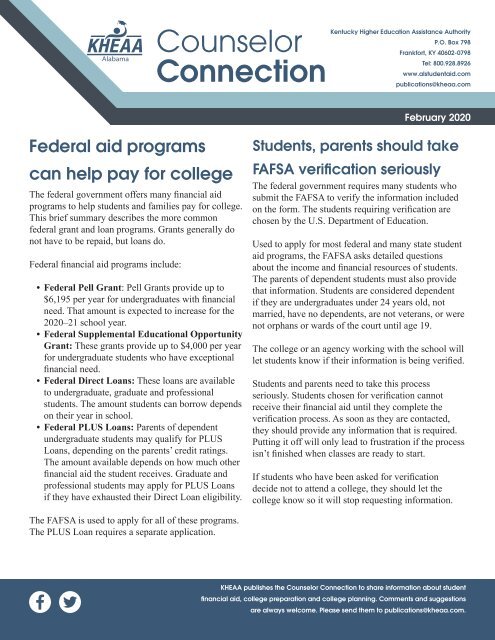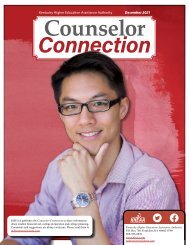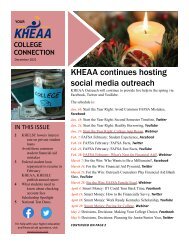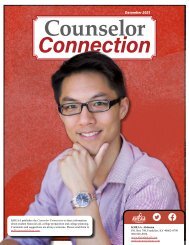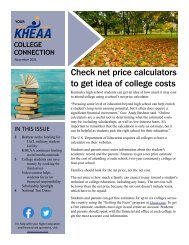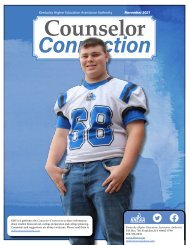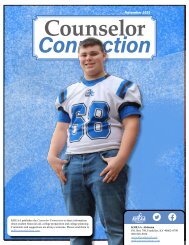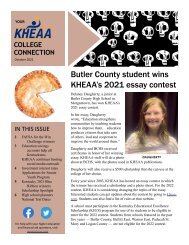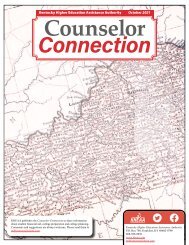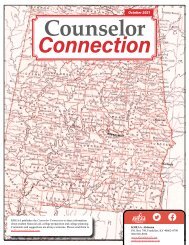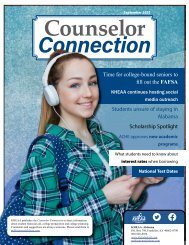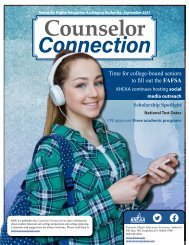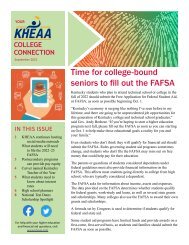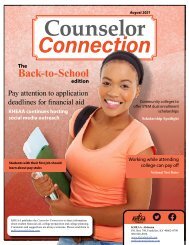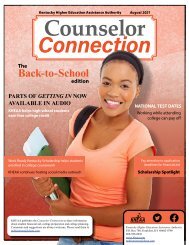AL - Counselor Connection - February 2020
You also want an ePaper? Increase the reach of your titles
YUMPU automatically turns print PDFs into web optimized ePapers that Google loves.
Alabama<br />
<strong>Counselor</strong><br />
<strong>Connection</strong><br />
Kentucky Higher Education Assistance Authority<br />
P.O. Box 798<br />
Frankfort, KY 40602-0798<br />
Tel: 800.928.8926<br />
www.alstudentaid.com<br />
publications@kheaa.com<br />
<strong>February</strong> <strong>2020</strong><br />
Federal aid programs<br />
can help pay for college<br />
The federal government offers many financial aid<br />
programs to help students and families pay for college.<br />
This brief summary describes the more common<br />
federal grant and loan programs. Grants generally do<br />
not have to be repaid, but loans do.<br />
Federal financial aid programs include:<br />
• Federal Pell Grant: Pell Grants provide up to<br />
$6,195 per year for undergraduates with financial<br />
need. That amount is expected to increase for the<br />
<strong>2020</strong>–21 school year.<br />
• Federal Supplemental Educational Opportunity<br />
Grant: These grants provide up to $4,000 per year<br />
for undergraduate students who have exceptional<br />
financial need.<br />
• Federal Direct Loans: These loans are available<br />
to undergraduate, graduate and professional<br />
students. The amount students can borrow depends<br />
on their year in school.<br />
• Federal PLUS Loans: Parents of dependent<br />
undergraduate students may qualify for PLUS<br />
Loans, depending on the parents’ credit ratings.<br />
The amount available depends on how much other<br />
financial aid the student receives. Graduate and<br />
professional students may apply for PLUS Loans<br />
if they have exhausted their Direct Loan eligibility.<br />
Students, parents should take<br />
FAFSA verification seriously<br />
The federal government requires many students who<br />
submit the FAFSA to verify the information included<br />
on the form. The students requiring verification are<br />
chosen by the U.S. Department of Education.<br />
Used to apply for most federal and many state student<br />
aid programs, the FAFSA asks detailed questions<br />
about the income and financial resources of students.<br />
The parents of dependent students must also provide<br />
that information. Students are considered dependent<br />
if they are undergraduates under 24 years old, not<br />
married, have no dependents, are not veterans, or were<br />
not orphans or wards of the court until age 19.<br />
The college or an agency working with the school will<br />
let students know if their information is being verified.<br />
Students and parents need to take this process<br />
seriously. Students chosen for verification cannot<br />
receive their financial aid until they complete the<br />
verification process. As soon as they are contacted,<br />
they should provide any information that is required.<br />
Putting it off will only lead to frustration if the process<br />
isn’t finished when classes are ready to start.<br />
If students who have been asked for verification<br />
decide not to attend a college, they should let the<br />
college know so it will stop requesting information.<br />
The FAFSA is used to apply for all of these programs.<br />
The PLUS Loan requires a separate application.<br />
KHEAA publishes the <strong>Counselor</strong> <strong>Connection</strong> to share information about student<br />
financial aid, college preparation and college planning. Comments and suggestions<br />
are always welcome. Please send them to publications@kheaa.com.
<strong>Counselor</strong> <strong>Connection</strong><br />
<strong>February</strong> <strong>2020</strong><br />
State’s National History<br />
Day to be held April 17<br />
Alabama students can enter the National History<br />
Day Contest by presenting a project on any historical<br />
topic related to the <strong>2020</strong> theme, “Breaking Barriers in<br />
History.” Students can create a documentary, exhibit,<br />
paper, performance or website.<br />
The contest is open to middle school and high school<br />
students.<br />
Alabama’s National History Day will be held on<br />
Friday, April 17, at Auburn University Montgomery.<br />
The top two projects in each category are invited to<br />
the national contest June 9–13 at the University of<br />
Maryland in College Park.<br />
Contact Jerald Crook, the Alabama coordinator, at<br />
205-558-3996 or at jcrook@alabamahumanities.org<br />
for more information.<br />
Visit www.nhd.org/ for more details.<br />
Online security can protect<br />
students from cyber theft<br />
The theft of credit and debit card numbers should<br />
make everyone, including students, more careful<br />
about protecting their money from cyber thieves. The<br />
following measures can help.<br />
Never provide a Social Security, bank account or<br />
credit card number in response to a phone call, text<br />
or email. Don’t click on any link in a text or email<br />
from a bank or company. It may lead to a fake site<br />
run by thieves hoping someone will enter personal<br />
information, or it may install spyware or malware on<br />
a phone or computer. Instead, students should sign in<br />
through the website they normally use when they do<br />
business with that firm.<br />
Never provide bank, credit card or other sensitive<br />
data on a website that doesn’t explain how a user’s<br />
information will be protected, including encryption to<br />
transmit and store data safely.<br />
When using ATM or debit cards, make sure no one<br />
can see the PIN. Check ATMs for obvious signs of<br />
tampering or for a skimming device.<br />
Install a free or low-cost firewall to stop intruders<br />
from gaining remote access to devices. Download and<br />
update security patches offered by your system and<br />
software vendors to correct weaknesses that could be<br />
exploited.<br />
2
<strong>Counselor</strong> <strong>Connection</strong><br />
<strong>February</strong> <strong>2020</strong><br />
Scholarship Spotlight<br />
American Legion Scholarship<br />
Eligibility: The applicant must:<br />
• be an Alabama resident.<br />
• be the son, daughter, grandson or granddaughter<br />
of a war veteran.<br />
• attend a participating school.<br />
Award: $850; renewable yearly<br />
Deadline: April 1<br />
Contact: The American Legion, Department Adjutant,<br />
P.O. Box 1069, Montgomery, <strong>AL</strong> 36102 (send a selfaddressed<br />
stamped envelope); www.legional.org<br />
(download application)<br />
Focus on the future<br />
With fixed rates and NO FEES, the Advantage<br />
Education Loan can take students’ minds off<br />
money so they can focus on their future.<br />
Feb. 28 is deadline to apply<br />
for summer STEM program<br />
The deadline to apply for the Appalachian Regional<br />
Commission’s Summer STEM Program is Feb. 28.<br />
The program is open to middle school students, high<br />
school students and high school teachers who live in<br />
the Appalachian region. Up to 26 high school students,<br />
26 middle school students and 26 teachers will be<br />
chosen. The exact number will depend on the available<br />
funding.<br />
High school and middle school students participate<br />
in science, math and computer science technology<br />
group research projects, working with award-winning<br />
scientists. Teachers work with STEM practitioners to<br />
develop STEM-related curricula.<br />
Teachers and high school students will attend a twoweek<br />
camp from July 5 through July 17. Middle<br />
school students will attend a one-week program from<br />
July 11 through July 17. Both programs will be held in<br />
Oak Ridge, Tennessee. Programs include lab time at<br />
the Oak Ridge National Laboratory.<br />
Students will receive transportation, room and board,<br />
as well as all expenses related to lab work and field<br />
trips. Teachers will receive the same package, plus a<br />
$1,000 stipend.<br />
Visit www.arc.gov/summerSTEM for more details.<br />
For details or to apply, go to<br />
AdvantageEducationLoan.com<br />
The program is also sponsored by the Oak Ridge<br />
National Laboratory and the Oak Ridge Associated<br />
Universities.<br />
3


